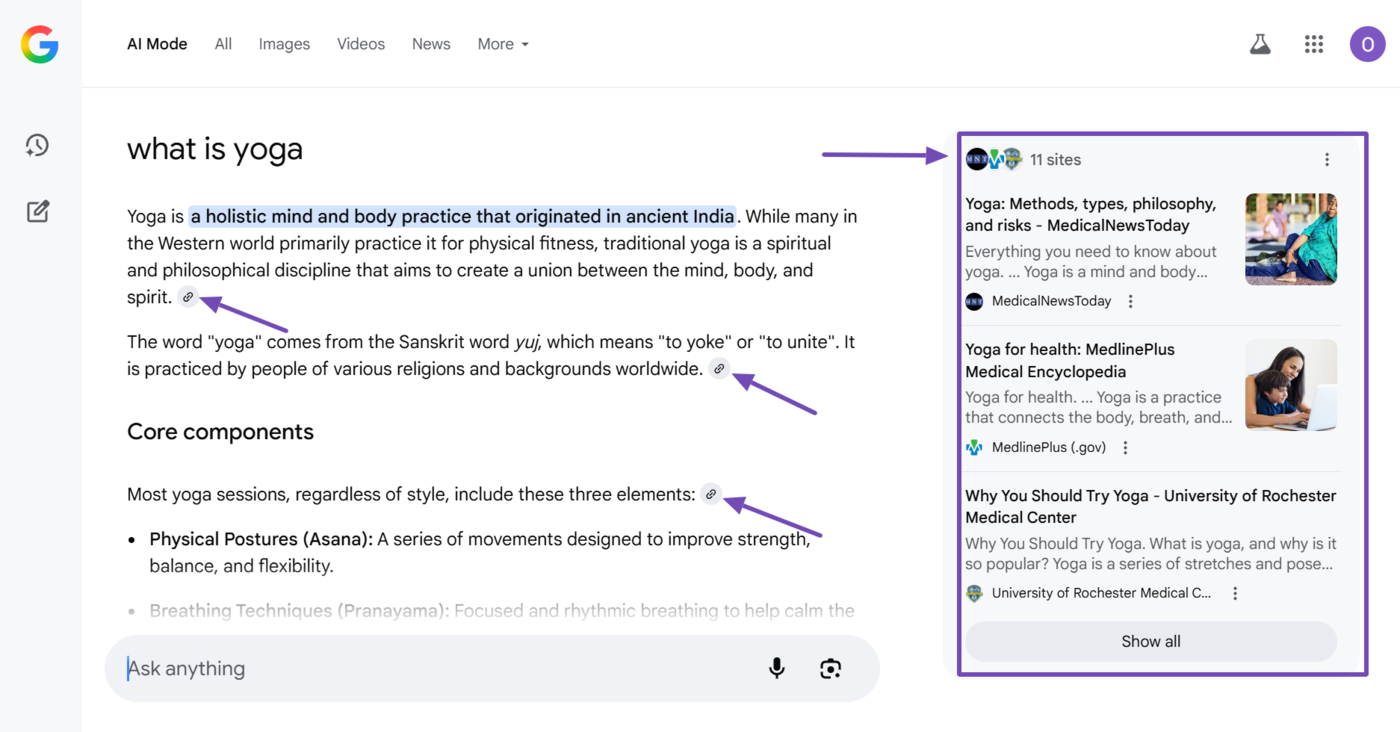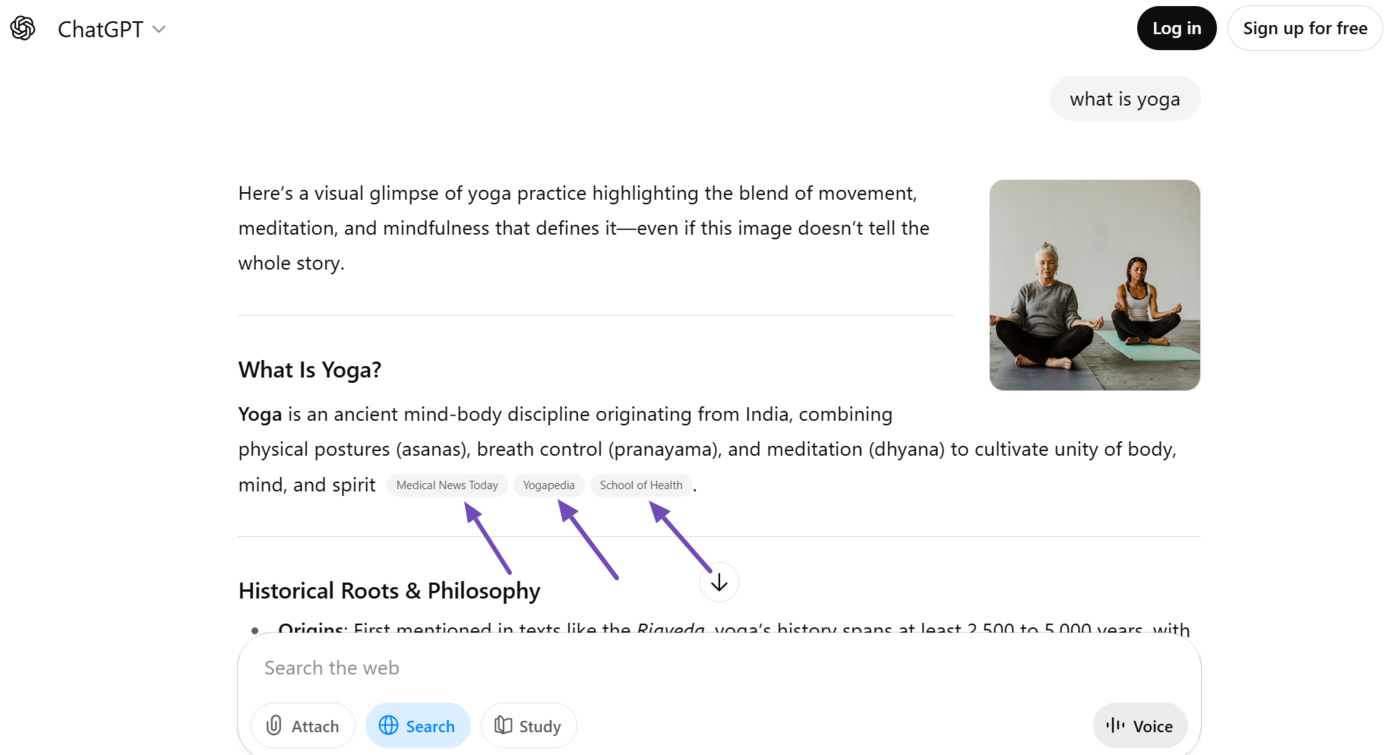What Is Generative Engine Optimization (GEO)?
Generative engine optimization (GEO) is the process of optimizing content so that artificial intelligence systems, such as large language models (LLMs), search engines, and generative AI chatbots, can understand and incorporate it into their responses.
Generative engine optimization is also referred to by other names, including generative AI optimization, AI search optimization, AI answer engine optimization, and large language model optimization (LLMO).
In this article, we’ll cover:
Importance of Generative Engine Optimization (GEO)
Generative engine optimization (GEO) ensures that generative AI systems, such as AI chatbots, answer engines, and large language models (LLMs), can properly understand, retrieve, and present your content to their users.
While you do not directly benefit from the specific content these systems generate for their users, you can still receive referral traffic from them.
This is because many of these AI systems usually include the links to their sources in the output they present to their users. Users who click on these links can then visit the webpage from which the response was generated.
For example, here are some sites and links that Google AI Mode, an answer engine, included in its response.

Similarly, here are some links that チャットGPT, a chatbot that can function as an answer engine, included in its response. Curious users can click on these links, which will direct them to the relevant webpage.

Generative engine optimization is also crucial as it allows you to prepare and future-proof your site for the AI-driven search landscape.
For one, there has been a surge in the development of generative AI systems by both new and existing providers, including traditional search engines such as Google and Bing. Google alone has three generative AI systems accessible to the public:
- Gemini — A generative AI assistant and chatbot
- AI Mode — An interactive answer engine built into Search
- AI Overviews — An AI-generated summary on the search results page
The influx of AI systems, even by the large multinational corporations, indicates that generative AI systems are here to stay, and their popularity is expected to continue growing in the future.
Generative engine optimization (GEO) ensures your site is ready for that future.
How GEO Will Reshape SEO
GEO is already changing how we do SEO, and could further impact it as time goes on. Here are some changes we have observed so far, along with those that can occur in the future.
1 GEO Will Make SEO More Important
Many bloggers and SEOs consider answer engines the next iteration of search. Both approaches (GEO and SEO) share the same core goal, which is to make content more visible and accessible to users.
They also aim to provide trustworthy and accurate results to their users and ensure that their systems can find and access relevant content on the web.
However, while generative AI systems do not rank pages in the same way as search engines, content that is well-optimized with strong on-page, off-page、 と technical SEO is far more likely to be retrieved and cited in AI-generated answers.
2 GEO Will Change How Bloggers Write
AI systems generally lack the intuition, intelligence, and common sense that humans possess. This means that they only understand what they are shown. This is called the “garbage in, garbage out” (GIGO) principle.
In other words, give artificial intelligence incorrect information, and it will return an incorrect answer. Similarly, if it is presented with complex information, it may struggle to understand what it is about, even if the content contains the correct answer.
This is why webpages optimized for GEO must be straightforward and well-structured, with proper header tags, numbering, and paragraphs. This makes them easier for AI to understand.
3 GEO Will Make the Search Intent More Important
Semantic search is a search technique that goes beyond matching the キーワード in a search query with those on a webpage. Instead, it aims to understand the searcher’s intent.
Google has already implemented semantic search over the past decade. However, it is about to become more mainstream with the arrival of AI chatbots and answer engines.
The use of certain AI techniques, such as query fan-out, further highlights the importance of search intent over keywords. Overall, as GEO becomes more popular, bloggers will need to create content that aligns with the search intent.
4 GEO Will Change How We Search
GEO has been changing how people search. Before the advent of generative AI systems, users typically employed simple keyword-based queries, which could be as brief as one or two words.
However, with AI systems, users are increasingly switching to longer, conversational, and intent-driven queries that can be up to two sentences in length.
Considering that most AI systems accept multimodal queries, we can expect users to increasingly utilize voice search and image searches in the future, which also tend to encourage the use of longer queries than regular search.
5 GEO Will Increase the Need for Structured Data
AI systems are expected to utilize structured data, and may even give it more priority than search engines do. This means structured data will likely become more crucial than ever.
This becomes especially important when you consider that search engines generally support a limited number of structured data, which they typically use to generate the rich results that they display on search results pages.
Google itself is also known to degrade certain rich results and their corresponding structured data, just as it did with the frequently asked questions (FAQ) and HowTo Schema.
However, AI systems, especially those that utilize the query fan-out technique, will likely require such structured data as well as other structured data that are not currently supported by search engines.
How to Optimize for Generative AI (GEO)
GEO is an emerging field within SEO. Unlike traditional SEO, where only humans and search engines need to understand your content, GEO requires that humans, search engines, and AI systems can all understand it.
Here are some tips to ensure your site remains accessible and valuable to both humans and AI systems, as well as search engines.
1 Create an llms.txt File
llms.txt is a file that guides AI systems to your most important content. This file is essential because AI systems crawl your site differently from search engines.
For instance, while a search engine crawls your entire site and stores it in an 索引, an AI system may only crawl specific parts of your site and use that to generate a response in real-time.
The llms.txt file ensures that the AI system can quickly locate your essential content without crawling irrelevant or low-priority pages. That said, you can refer to this guide on creating a llms.txt file on your site.
3 Implement On-Page, Off-Page, and Technical SEO
AI systems want to return accurate, high-quality, and trustworthy responses to their users. They also want to be able to access your site to extract relevant content.
This means they will likely rely on many of the same signals, such as content quality and バックリンク, that matter for SEO.
Overall, to increase the chances of your site being GEO-ready, make sure your on-page, off-page, and technical SEO remain top-notch. If you run a local business, you should also optimize for local SEO.
2 Get More Brand Mentions
Increase the number of mentions you receive across the web. This includes mentions from blogs, news sites, and social media platforms.
AI systems typically crawl these sites and apps, and receiving brand mentions there can improve your trust, relevance, and authority in the eyes of the AI system, and increase their chances of using your content in their responses.
4 Add Schema Markup to Your Content
Ensure to implement Schema マークアップ on your site. This includes relevant Schema, including those that may have been deprecated by search engines. Such structured data can be crucial for AI systems as it allows them to better understand your content.
5 Include FAQs and Q&A Sections
Include frequently asked questions (FAQs) and questions and answers (Q&As) on your site when necessary. Both are essential and align with how AI systems present information to users.
For one, AI systems are essentially question-and-answer systems. Many AI chatbots and answer engines also utilize query fan-out, where they break down queries into sub-queries, which are essentially questions and concepts related to the query.
6 Optimize for Conversational Queries
Users typically use a conversational tone when entering their search terms into answer engines. In most cases, this query is usually more detailed than that used on regular search engines.
This makes them more precise than regular queries. It also means their keywords are usually long-tail keywords. This means you have to optimize for conversational long-tail keywords when optimizing for GEO.